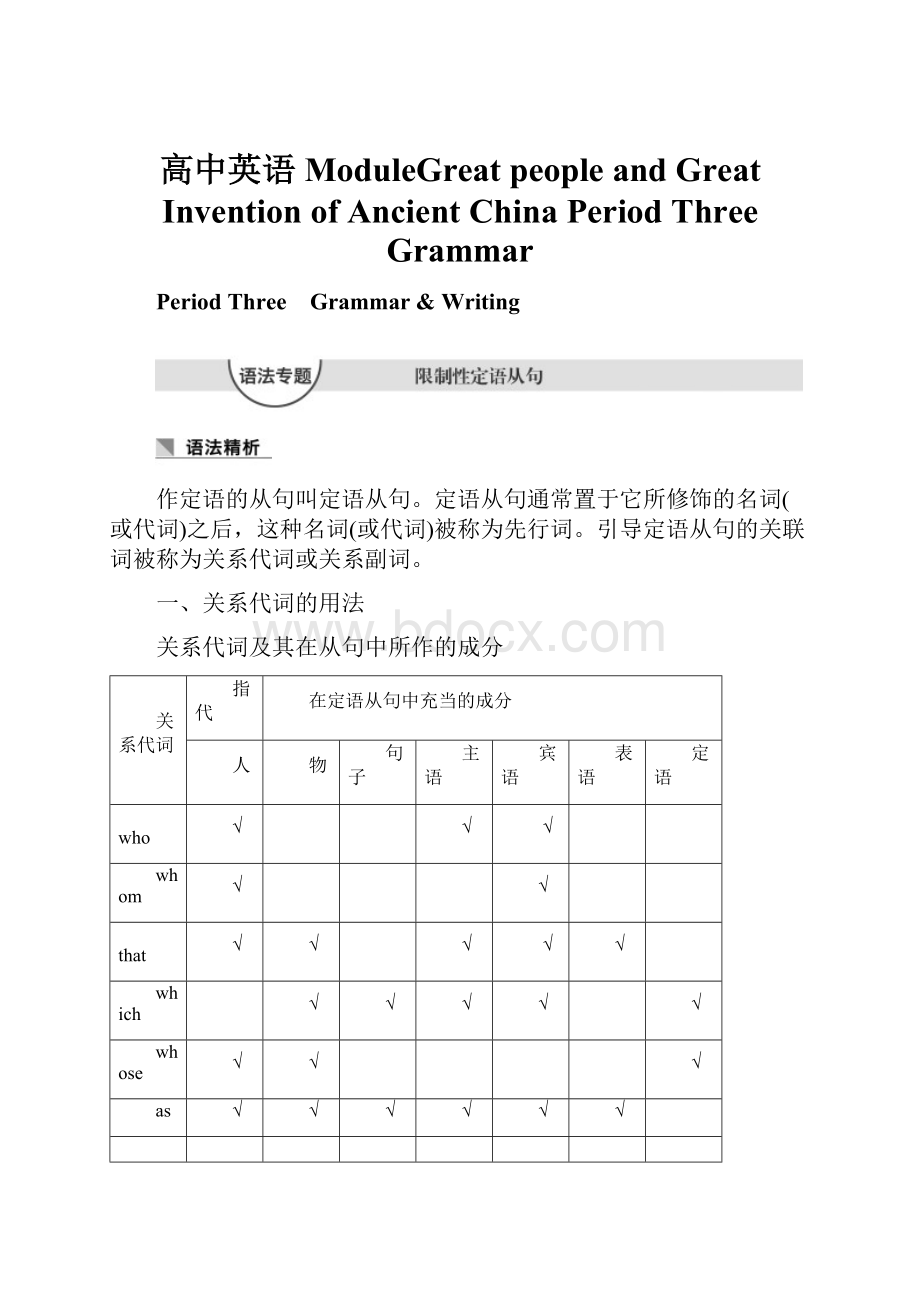高中英语 ModuleGreat people and Great Invention of Ancient China Period Three Grammar.docx
《高中英语 ModuleGreat people and Great Invention of Ancient China Period Three Grammar.docx》由会员分享,可在线阅读,更多相关《高中英语 ModuleGreat people and Great Invention of Ancient China Period Three Grammar.docx(18页珍藏版)》请在冰豆网上搜索。

高中英语ModuleGreatpeopleandGreatInventionofAncientChinaPeriodThreeGrammar
PeriodThree Grammar&Writing
作定语的从句叫定语从句。
定语从句通常置于它所修饰的名词(或代词)之后,这种名词(或代词)被称为先行词。
引导定语从句的关联词被称为关系代词或关系副词。
一、关系代词的用法
关系代词及其在从句中所作的成分
关系代词
指代
在定语从句中充当的成分
人
物
句子
主语
宾语
表语
定语
who
√
√
√
whom
√
√
that
√
√
√
√
√
which
√
√
√
√
√
whose
√
√
√
as
√
√
√
√
√
√
Ishethemanwho/thatwantstoseeyou?
他就是想见你的人吗?
Heistheman(whom/that)Isawyesterday.
他就是我昨天看见的那个人。
Canyoushowmethephotowhich/thatwastakenintheWestLake?
你能让我看看在西湖拍的照片吗?
I’llneverforgettheday(which/that)wespenttogether.
我永远不会忘记我们在一起度过的日子。
即时跟踪1 用适当的关系代词填空
(1)Shelivesinahousewhosewindowsallfacesouth.
(2)Jackwhoisalwaysreadytohelpothersisaverykindheartedman.
(3)Heisthemanwho/whomIgottoknowatthemeetingyesterday.
(4)Thetrainwhich/thathasjustleftisforNanning.
(5)ThiswasthesamesituationasIimagined.
二、关系副词的用法
关系副词
指代
先行词
在定语从句中充当的成分
when
时间
时间名词
时间状语
where
地点
地点名词
地点状语
why
原因
reason
原因状语
We’llneverforgetthedaywhenthePeople’sRepublicofChinawasfounded.
我们决不会忘记中华人民共和国成立的那一天。
Theofficewhereheworksisonthesecondfloor.
他工作的办公室在二楼。
Thereasonwhyhedidn’tcomewasunknown.
他没来的原因还不清楚。
即时跟踪2 用适当的关系副词填空
(1)IstillrememberthedaywhenIbecameacollegestudent.
(2)Thatisthereasonwhyheisleavingsosoon.
(3)IforgotthehousewheretheSmithslived.
三、关系代词用that不用which的情况
1.当先行词是不定代词时,如all,everything,anything,nothing,much,few,little,none等。
Allthathehasdoneisoflittlehelp.
他所做的没有一点儿帮助。
2.当先行词前面有theonly,thelast,thenext,few,no,all,thevery等修饰词时。
ThisistheverymanthatIwanttosee.
这正是我想见的那个人。
3.当先行词为序数词/形容词最高级或被序数词/形容词最高级修饰时。
Thisisthefirstletterthathehaswrittentome.
这是他给我写的第一封信。
4.当先行词既有人又有物时。
Weweredeeplymovedbythemanandhisstorythatshetoldus.
她告诉我们的那个人和他的故事深深地打动了我们。
5.当主句是以who,which或what开头的特殊疑问句时。
Whoisthemanthatiswaitingattheschoolgate?
在学校门口等着的那个人是谁?
即时跟踪3 用关系代词that或which填空
(1)Hedidallthathecouldtohelpus.
(2)ThisistheverybusthatI’mwaitingfor.
(3)ThisisthemostinterestingnovelthatI’veeverseen.
(4)WhatisthefirstAmericanfilmthatyouhaveseen?
(5)Canyourememberthescientistandhistheorythatwelearnttheotherday?
四、“介词+关系代词”引导的定语从句
1.关系代词的选定
如果先行词指事(物),关系代词就用which,指人用whom。
Thisistheclassroominwhichwestudiedlastyear.
这就是我们去年学习用的教室。
Hewasouruncleofwhomwewereafraid.
他就是我们都害怕的叔叔。
2.介词的选定
(1)根据先行词来选用介词。
ThereasonforwhichIcamehereisthatIwanttogetyourhelp.
我来这儿的原因是我想得到你的帮助。
ThefarmonwhichIonceworkedhastakenonanewlook.
我曾经工作过的农场呈现出一派新景象。
(2)根据定语从句中的谓语动词或形容词来选用介词。
ThepersontowhomIspokejustnowismyEnglishteacher.
我刚才与之讲话的那个人是我的英语老师。
Chinaofwhichwearegreatlyproudisabeautifulcountry.
我们为之感到非常骄傲的中国是个美丽的国家。
(3)根据句意确定介词。
ThisisthepilotforwhomIboughtacamera.
这个就是我给他买照相机的飞行员。
即时跟踪4
(1)用适当的介词填空
①Inthedarkstreet,therewasn’tasinglepersontowhomshecouldturnforhelp.
②Thepoormanhasnohouseinwhichhecanlive.
③Hebuiltatelescopethroughwhichhecouldstudytheskies.
④Ididn’tknowthereasonforwhichhecamelate.
⑤Isthisthecarforwhichyoupaidahighprice?
(2)用适当的关系代词或“介词+关系代词”填空
①ThisistheshopinwhichImethimforthefirsttime.
②IknowtheboyfromwhomyouborrowedtheEnglishnovel.
③Itwasacrisisforwhichshewastotallyunprepared.
④Thisisthemantowhomweoftenturnforhelp.
=Thisistheman(whom/who/that)weoftenturntoforhelp.
Ⅰ.用适当的关系词填空
1.Ilivenextdoortoacouplewhosechildrenoftenmakealotofnoise.(2016·北京)
2.Someexpertsthinkreadingisthefundamentalskilluponwhichschooleducationdepends.
(2015·安徽)
3.Asthesmallestchildofhisfamily,Alexisalwayslongingforthetimewhenheshouldbeabletobeindependent.(2015·陕西)
4.Thebossofthecompanyistryingtocreateaneasyatmospherewherehisemployeesenjoytheirwork.(2015·天津)
5.Creatinganatmosphereinwhichemployeesfeelpartofateamisabigchallenge.(2015·浙江)
6.Maybeyouhaveahabitthat/whichisdrivingyourfamilycrazy.(2014·新课标全国Ⅰ)
7.Acompanywhoseprofitsfromhomemarketsaredecliningmayseekopportunitiesabroad.
(2014·山东)
8.Pleasesendusalltheinformationthatyouhaveaboutthecandidatefortheposition.(2014·陕西)
9.TheexactyearwhichAngelaandherfamilyspenttogetherinChinawas2008.(2014·安徽)
10.Happinessandsuccessoftencometothosewhoaregoodatrecognizingtheirownstrengths.
(2013·湖南)
Ⅱ.单句改错(每小题仅有1处错误)
1.Thedishes
或whatIcookedwereMom’sfavorite.(2016·四川,短文改错)
2.Third,weshouldfindwaystoreusethewaterusedinwashing,especiallybathwaterforwhichisquitealot,andthatwillsavemuchwater.(2012·大纲全国Ⅱ,短文改错)
3.Afterhearingyoursadstories,hewillsaysomewordsthat
niceandwarm.
(2010·重庆,短文改错)
4.What’smore,agoodfriendiswillingtoofferthehelptowhichyouneed,orcanatleastgiveyousomeadvice.(2010·重庆,短文改错)
5.Hewouldn’tgotoseeaplaythatnoonelikedit.(2008·陕西,短文改错)
6.Itisalsoawindow
whichwecanlearnaboutAmericansociety.(2008·重庆,短文改错)
文体指导
正反对比类议论文是从正反两方面辩证地说明某个观点。
正反对比类议论文在高考中占很大比例,是中学英语写作的重点体裁之一。
正反对比类议论文的表现形式是:
先提出某个现象,然后进行正反两方面的论述,是一种限定性的写作,其论点、论据和论证相对比较简单。
它要求同学们结合题目要求,从正反两个方面陈述各自的理由,要点要全面,层次要清晰,通常最后都要求简述自己的看法,来引发人们的思考。
正反对比类议论文通常分成四段:
第一段综述议论的内容;第二段表述正方观点及理由;第三段表述反方的观点及理由;第四段陈述自己的观点。
正反对比类议论文一般是同一时态,对当前某种观点的议论用一般现在时,对过去讨论的阐述要用一般过去时,最后在表达自己的观点时,要用一般现在时。
正反对比类议论文模板
导入:
第1段
Recentlywe’vehadadiscussionaboutwhetherweshould...(导入话题)
Ouropinionsaredividedonthistopic.(观点有分歧)
正文:
第2段:
Mostofthestudentsareinfavorofit.(正方观点)
Herearethereasons.First...Second...Finally...(列出2~3个赞成的理由)
第3段:
However,theothersarestronglyagainstit.(反方观点)
Theirreasonsareasfollows.Inthefirstplace...What’smore...Inaddition...(列出2~3个反对的理由)
结论:
第4段
Personallyspeaking,theadvantagesoverweighthedisadvantages,foritwilldousmoregood,soIsupportit.(个人观点)
常用句式
1.Lastweek,wehadadiscussionaboutwhether...
2.Therearetwodifferentopinionsabout...
3.Somethinkthat...,butotherssay/considerthat...
4.Somestudentsarefor/agreetoit,while/butothersareagainst/disagreetoit.
5.Ononehand,...ontheotherhand,...
6.Generally(speaking),morestudentsthinkweshould...
7.First,...Second,...Finally,...
8.Besides/Inaddition/Also/Apartfromit...
9.Asaresult,...Therefore,...
10.Ihavemyownviewabout...
写作任务
请根据下列表格中的提示,就“中学生看电视的利弊”用英语写一篇短文,并谈谈你的看法。
利
弊
你的看法
1.帮助了解国内外大事;
2.拓宽视野,增长知识;
3.丰富生活,放松身心。
1.浪费时间,影响学习;
2.减少锻炼,影响健康。
……
注意:
1.词数100左右;
2.可适当增加细节,以使行文连贯。
审题谋篇
第一步 明确要求
本文要求就“中学生看电视的利弊”写一篇正反对比类议论文,要注意此类文章的写作要求,时态应以一般现在时为主。
第二步 确定段落
本文可采用三段式:
Para.1:
阐述中学生看电视的益处;
Para.2:
介绍中学生看电视的弊端;
Para.3:
简单谈谈自己的观点。
第三步 词汇热身
1.对……有好处begoodfor
2.让某人了解/知道informsb.of
3.国内外athomeandabroad
4.另外;而且what’smore/besides
5.另一方面ontheotherhand
6.影响affect/haveaneffecton
第四步 句式升级
1.人们普遍相信看电视对我们有好处。
(一般表达)WebelievethatwatchingTVisgoodforus.
(句式升级)ItiswidelybelievedthatwatchingTVisgoodforus.
2.电视可以让我们了解国内外正在发生的大事。
(一般表达)WatchingTVcanletusknowmanythingsabouttheworld.
(句式升级)WatchingTVcankeepuswellinformedofwhat’shappeningathomeandabroad.
3.如果我们每天长时间地坐在电视机前,我们很容易发胖并且还会近视。
(一般表达)IfwewatchTVtoomuch,wewillbecomefatandshortsighted.
(句式升级)IfwesitinfrontofaTVsetforalongtimeeveryday,wecaneasilyputonweightandbecomeshortsighted.
连句成篇
ManyofusmiddleschoolstudentsenjoywatchingTV.ItiswidelybelievedthatwatchingTVisgoodforus.Firstly,itcankeepuswellinformedofwhat’shappeningathomeandabroad.Secondly,itcanincreaseourknowledge.What’smore,itmakesourlifecolorfulandisagoodwaytorelax.
Ontheotherhand,watchingTValsohassomedisadvantagestous.Firstofall,itsometimeswasteslotsoftimeandevenaffectsourstudies.Besides,ifwesitinfrontofaTVsetforalongtimeeveryday,wecaneasilyputonweightandbecomeshortsighted.
Frommypointofview,weshouldchoosesomeprogramstowatchandspendareasonableamountoftimewatchingTV.
Ⅰ.单元语法
A)用适当的关系词填空
1.Themediatodaycandrawpublicattentiontosituationswherehelpisactuallyneeded.
2.Thedaysaregonewhenwestudiedtogether,butIcanstillrememberyourlovelyvoice.
3.Themanwhowashereyesterdayisapainter.
4.Shedescribedinhercompositionthepeopleandplacesthatimpressedhermost.
5.That’sthereasonwhyIwrotetohim.
B)把下列句子合并为含有定语从句的主从复合句
6.Ihaveafriend.Helikeslisteningtoclassicalmusic.
Ihaveafriendwholikeslisteningtoclassicalmusic.
7.YesterdayEmilywaswearingthenewdress.Igaveittoher.
YesterdayEmilywaswearingthenewdressthat/whichIgaveher.
8.Thestudent’sarticlewaspublished.Iknowthestudent.
Iknowthestudentwhosearticlewaspublished.
9.Givemeonegoodreason.Ishouldhelpyouforthereason.
Givemeonegoodreasonwhy/forwhichIshouldhelpyou.
10.YesterdayIpaidavisittothehouse.Myparentsoncelivedthere.
YesterdayIpaidavisittothehousewhere/inwhichmyparentsoncelived.
Ⅱ.阅读理解
A
EachIndiantribehadadifferentlanguage.ManyIndiansneverlearnedanylanguagesexcepttheirown.DoyouknowhowIndiansfromdifferenttribestalkedtoeachother?
Theyhadtwowaystotalkwithoutsound.Onewaywasbysignlanguage;anotherwaybysignals.
Signlanguageisawayoftalkingbyusingsigns.Indiansusedsignlanguagewhentheymetstrangers.Inthisway,theycouldfindoutwhetherthestrangerwasafriendoranenemy.InIndiansignlanguage,signsweremadewiththehands.Onesignmeant“man”.Anothermeant“horse”.Totellthetimeofdaywhen